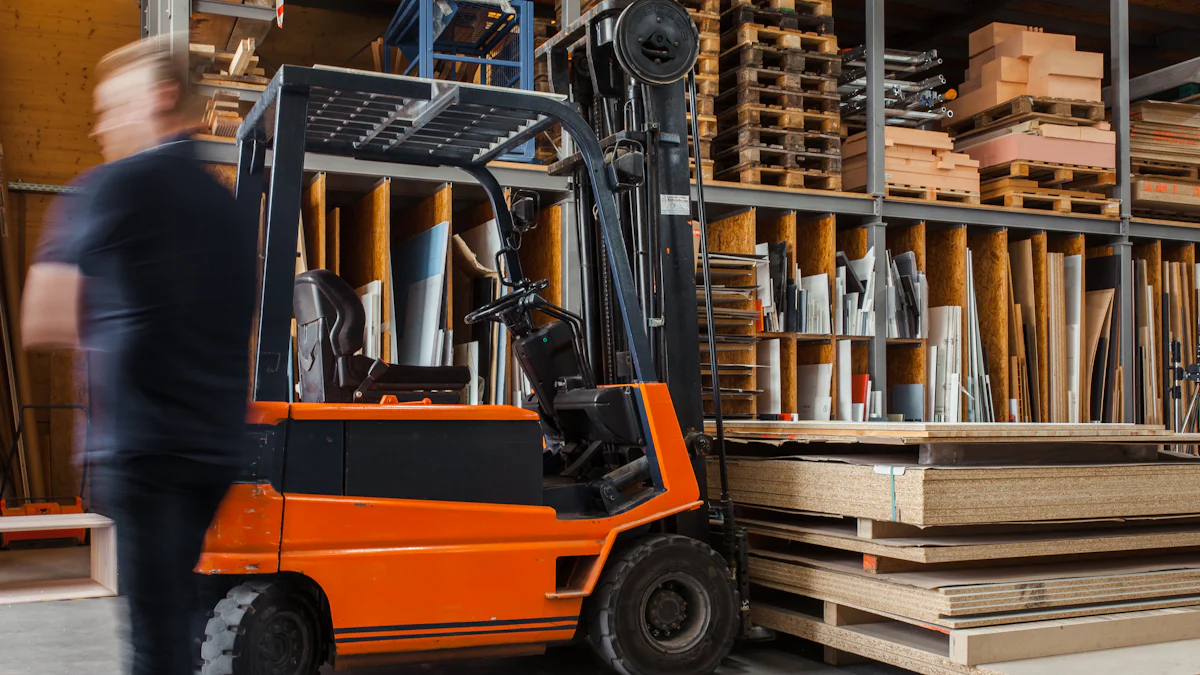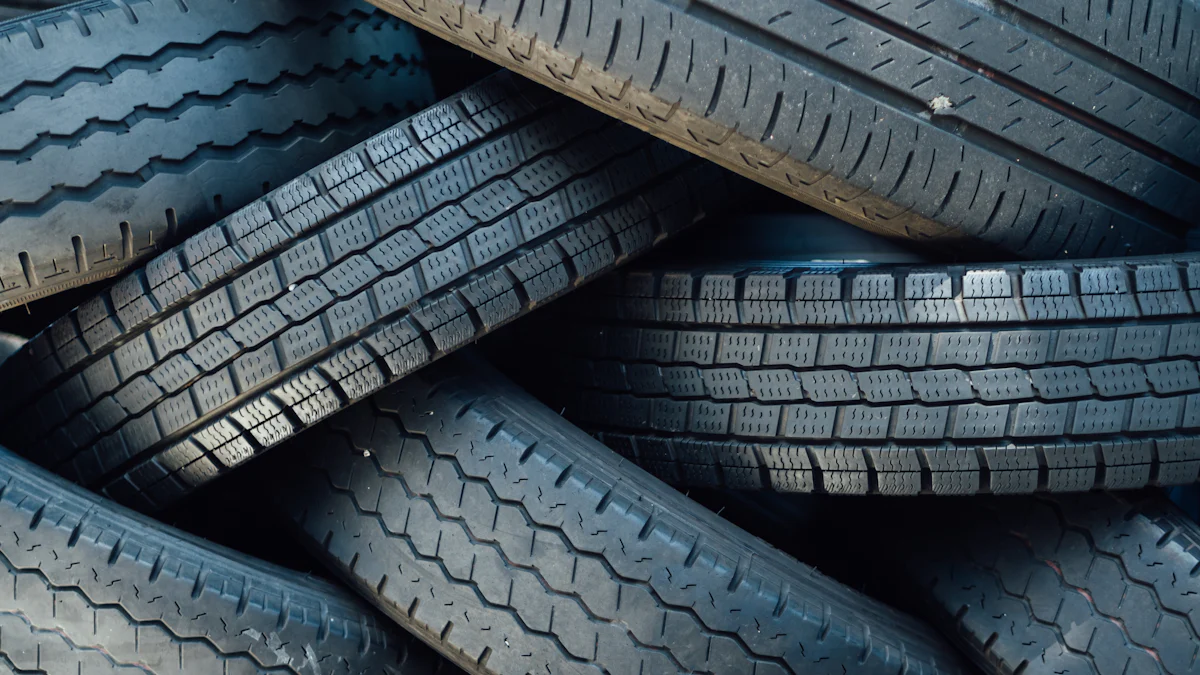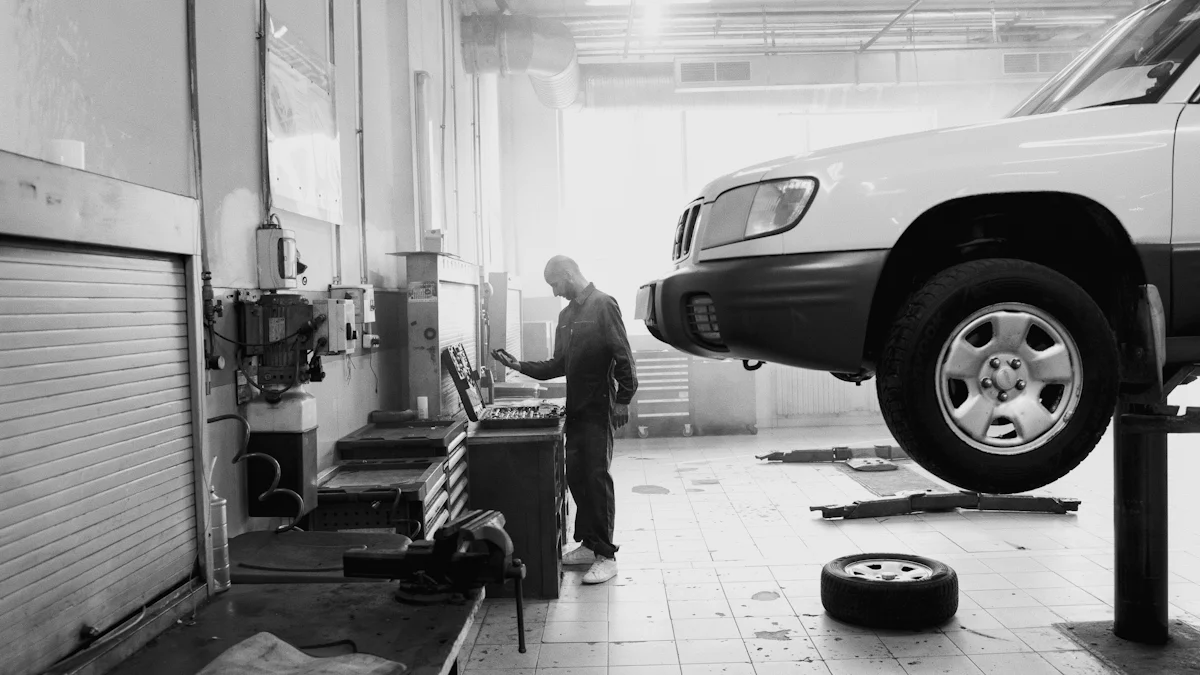
Electric pallet jacks play a crucial role in efficient material handling processes. Wheels pallet jack electric are the unsung heroes, bearing the weight of operations with precision. Selecting the optimal wheel material is paramount for seamless functionality and durability. In this blog, we delve into the realm of wheels pallet jack electric, comparing materials like polyurethane, rubber, nylon, and steel to aid in informed decision-making.
Types of Materials Used in Electric Pallet Jack Wheels

Polyurethane Wheels
Polyurethane wheels, known for their excellent load-bearing capacity and durability, are a popular choice for electric pallet jacks. These wheels offer a smoother ride and quieter operation compared to other materials. Here are some key points to consider:
- Provide floor protection and have good resistance to chemicals and oils.
- Ideal for heavy-duty applications, both indoors and outdoors.
- Non-marking wheels that won’t leave scuffs on floors.
In the words of an expert, “Polyurethane wheels excel in shock absorption, providing a smoother ride and reducing wear and tear.” This makes them suitable for various environments, including retail spaces where noise reduction is crucial.
Rubber Wheels
Rubber wheels are another option for electric pallet jack wheels. While they offer good shock absorption and are suitable for indoor use on smooth surfaces, they may not be as durable as polyurethane or nylon wheels. Consider the following:
- Good shock absorption properties.
- Suitable for indoor use on smooth surfaces.
- May not withstand heavy loads as well as other materials.
According to industry insights, “The choice between rubber and polyurethane wheels depends on the application.” This highlights the importance of understanding specific operational needs when selecting the right material.
Nylon Wheels
Nylon wheels are highly durable and can withstand heavy loads without compromising performance. Although they may not provide the same level of shock absorption as rubber wheels, they excel in strength and longevity. Key features include:
- Highly durable with excellent load-bearing capacity.
- Capable of withstanding heavy loads without compromising performance.
- Less shock absorption compared to rubber wheels.
An industry professional noted that “For consistently heavy loads, nylon wheels may be more appropriate.” This emphasizes the need to match wheel materials with the intended usage scenarios.
Steel Wheels
Characteristics
- Durability: Steel wheels are renowned for their exceptional durability and strength, making them a reliable choice for heavy-duty applications.
- Load-Bearing Capacity: These wheels boast a high load-bearing capacity, ensuring they can withstand significant weights without compromising performance.
- Resistance to Wear: Steel wheels exhibit excellent resistance to wear and tear, providing long-lasting support in demanding operational environments.
Advantages
- Robustness: The robust nature of steel wheels makes them ideal for withstanding rough surfaces and challenging conditions.
- Longevity: Due to their durability, steel wheels have a longer lifespan compared to other materials, offering sustained performance over time.
- Stability: Steel wheels provide stability during operation, contributing to smooth movement and enhanced control.
Disadvantages
- Noise Levels: One drawback of steel wheels is their tendency to produce more noise during operation compared to materials like polyurethane or rubber.
- Floor Protection: Unlike polyurethane or rubber wheels that offer floor protection, steel wheels may cause damage on certain surfaces due to their hardness.
- Weight Consideration: Steel wheels are heavier than alternative materials, which can impact the overall maneuverability of electric pallet jacks.
Comparison Based on Usage
Indoor vs. Outdoor Use
When considering the wheels pallet jack electric for indoor use, certain materials stand out for their specific advantages. For indoor applications where noise reduction and floor protection are crucial, Polyurethane Wheels emerge as a top choice. These wheels offer a quieter operation and ensure that floors remain unscathed. On the other hand, Rubber Wheels also prove to be suitable for indoor use due to their shock absorption properties, making them ideal for smooth surfaces indoors.
Conversely, when it comes to outdoor use, durability and resilience become paramount factors in selecting the right wheel material. Steel Wheels, known for their exceptional strength and longevity, shine in outdoor environments where rough terrains are common. Their robust nature allows them to withstand challenging conditions effectively.
Load Capacity
For light load requirements, Rubber Wheels and Nylon Wheels present viable options due to their balance of durability and performance. Rubber wheels excel in shock absorption for lighter loads on smooth surfaces, while nylon wheels offer excellent load-bearing capacity without compromising efficiency.
In contrast, heavy load scenarios demand materials that can endure substantial weights without faltering. In such cases, Steel Wheels and Polyurethane Wheels come into play as reliable choices. Steel wheels boast high load-bearing capacities, ensuring stability under heavy loads, while polyurethane wheels provide a smoother ride even with significant weights.
Floor Surface Compatibility
When it comes to floor surface compatibility, the choice of wheel material can significantly impact operational efficiency. Smooth Surfaces require materials like polyurethane or rubber wheels that offer traction without causing damage. Polyurethane wheels are particularly adept at navigating smooth surfaces with ease.
On the other hand, Rough or Uneven Surfaces call for more robust options such as steel or nylon wheels that can handle the challenges posed by irregular terrains. Steel wheels’ durability shines on rough surfaces by providing stability and control during operation.
Practical Advice on Selection and Maintenance

Factors to Consider When Choosing Wheel Material
Environment
- Consider the operating environment when selecting wheel material for electric pallet jacks.
- Evaluate whether the pallet jack will be used indoors or outdoors to determine the best-suited material.
- Assess factors like temperature variations and exposure to chemicals in the environment.
Load Requirements
- Analyze the load requirements of your operations to match them with the appropriate wheel material.
- Determine whether your electric pallet jack will handle light or heavy loads to choose the most suitable wheels.
- Take into account the weight distribution and frequency of load handling for optimal performance.
Frequency of Use
- Factor in how often the electric pallet jack will be in operation when deciding on wheel materials.
- Consider the intensity of usage, such as daily versus occasional use, to select durable wheels that can withstand frequent movement.
- Ensure that the chosen material aligns with the expected wear and tear based on operational frequency.
Maintenance Tips for Different Wheel Materials
Polyurethane
- Inspect polyurethane wheels regularly for signs of wear or damage.
- Clean wheels with mild soap and water to maintain their performance and appearance.
- Avoid exposure to harsh chemicals that may deteriorate polyurethane material over time.
Rubber
- Check rubber wheels periodically for wear patterns or deformities.
- Use a rubber protectant to prevent cracking and extend the lifespan of the wheels.
- Keep rubber wheels clean from debris that could impact traction and overall functionality.
Nylon
- Monitor nylon wheels for any cracks or structural weaknesses during routine checks.
- Apply lubrication as needed to ensure smooth rotation and reduce friction on nylon surfaces.
- Protect nylon wheels from extreme temperatures that could affect their durability over time.
Steel
- Inspect steel wheels for rust formation or corrosion regularly, especially in high-moisture environments.
- Apply a rust-resistant coating to steel wheels as a preventive maintenance measure.
- Keep steel wheels dry and free from moisture accumulation to maintain their structural integrity.
Investing in high-quality pallet truck wheels ensures their durability and longevity. Wheels made from robust materials can withstand heavy usage and resist wear and tear, reducing the need for frequent replacements and saving you money in the long run. In a side-by-side comparison, the choice between Polyurethane and Nylon wheels boils down to your specific operational needs. If you prioritize durability and strength, Nylon wheels may be the optimal choice. Conversely, if a smoother ride, floor protection, and quieter operation are crucial, Polyurethane wheels emerge as the preferred option.
Post time: Jun-25-2024
